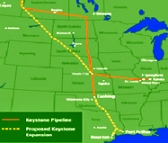TransCanada expects Keystone XL approval after Obama re-election
TransCanada still expects to receive White House approval for its 830,000-bpd Keystone XL pipeline project after President Barack Obama's re-election, the company said Friday.
TransCanada's current Keystone pipeline runs from Western Canada to Cushing, Okla. The proposed Keystone XL would extend that pipeline to the US Gulf Coast, which has the largest concentration of oil refining and shipping operations in the world.
If Keystone XL is approved, vast amounts of heavy crude oil flowing from the Canadian oil sands can reach the refineries for processing and distribution around the US and the world.
Supporters of the project say it will create jobs, lower gasoline prices and spur US energy independence by greatly increasing the amount of crude and petroleum products available to the US for domestic use and exports.  However, the project has drawn the ire of the Sierra Club and other environmental groups, which are worried about safety along the pipeline and the make-up of Canada's crude.
However, the project has drawn the ire of the Sierra Club and other environmental groups, which are worried about safety along the pipeline and the make-up of Canada's crude.
The project remains a political powder keg, awaiting an Obama administration decision.
The pipeline became an election issue after the State Department, charged with approving cross-border pipelines into the US, rejected TransCanada's permit last year, but said it would review a revised application.
TransCanada has submitted its plan, and believes the project will be approved by the second quarter of next year, company spokesman Michael Barnes said.
"We have been working with the current administration to advance the Keystone XL Pipeline to a decision on our [permit] application, and we will continue to do so," Mr. Barnes said. TransCanada expects pipeline construction to take two years after approval.
The State Department is expected to decide the fate of Keystone XL in 2013. Unfortunately for Obama, the election didn't simplify the thorny politics surrounding Keystone.
The energy industry wants the expansion approved and the environmental community wants it rejected. Depending on what Mr. Obama eventually decides, the pipeline will be viewed as a win for North American energy independence or a victory for climate-change activists who say Canada's crude extracted from oil sands are dirtier than conventional oil supplies.
 A decision might ultimately hinge on the person who replaces Secretary of State Hillary Clinton, who is expected to step down in Mr. Obama's second term. One person thought to be a candidate for her position is Sen. John Kerry (D., Mass.), one of the more vocal lawmakers on climate change.
A decision might ultimately hinge on the person who replaces Secretary of State Hillary Clinton, who is expected to step down in Mr. Obama's second term. One person thought to be a candidate for her position is Sen. John Kerry (D., Mass.), one of the more vocal lawmakers on climate change.
However, some oil industry analysts believe the most likely outcome will be that the White House will approve Keystone XL, but add stringent environmental safeguards that have the potential to hinder profits.
Those analysts also worry that the unprecedented hurdles encountered by TransCanada in what used to be a routine approval process now will become the norm for companies wanting to build pipelines aimed at bringing Canada's rapidly surging oil production south.
"The bigger question is whether every southbound pipeline will take six years to be built," Kevin Book, managing director of energy consultancy ClearView Energy Partners.
Canadian production is expected to double to 6.2 million bpd by 2030.
Environmental groups, however, remain confident that the White House will ultimately reject TransCanada's application. Sierra Club executive director Michael Brune added that the effect of Hurricane Sandy on the US east coast may bring climate change politics to the fore.
Calgary-based TransCanada originally applied for the permit in 2009 and has signed supply contracts with Valero Energy and other Gulf Coast refiners who want access to the heavy crude, which is sold at a discount to other crude types because it is more difficult to process.
Canadian oil producers hope to send their increasing oil production south to the Gulf Coast, which is the heart of the US refining industry and currently buys heavy oil from Mexico and Venezuela.
The shortage of oil pipelines leading from western Canada to the US has led to a glut on the Canadian side of the border that is costing Canadian oil producers $20 billion/year, said Tim Shipton, president of Western Canadian business association Alberta Enterprise Group.
Canadian Resource Minister Joe Oliver said the Canadian government would continue to lobby the White House to approve the project, calling it "clearly in the US national interest" by making the US less dependent on oil from overseas.
"We believe it will ultimately be approved," Mr. Oliver said.
Dow Jones Newswires






Comments